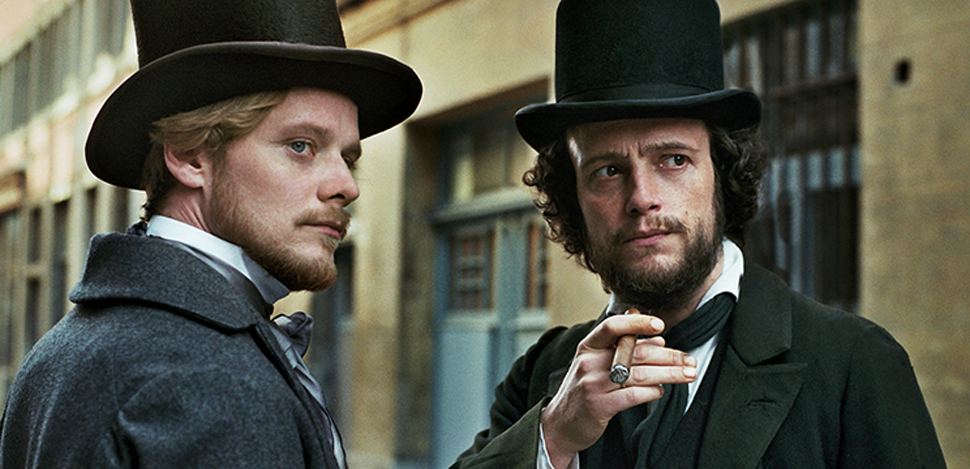
Haitian director/co-writer Raoul Peck’s well-made The Young Karl Marx is one of the most significant biopics in cinema history and arguably among the genre’s best. As the 200th anniversary of the birth of communism’s co-founder approaches on May 5, Peck has beautifully dramatized Marx’s life during the 1840s as a 20-something lover, writer, husband, philosopher, father, journalist, friend, and above all, revolutionary. Actor August Diehl (Quentin Tarantino’s 2009 Inglourious Basterds) delivers a moving, truthful performance as the thinker who, as this movie reveals, was also a man of action.
For those knowledgeable about the title character’s philosophy and writings, YKM seems accurately grounded in fact, true to both the letter and spirit of Marx and his life. But Peck’s script, co-authored by the philosophically named Pascal Bonitzer (who’d collaborated with Peck on another lefty biopic, 2000’s Lumumba, about the Congolese revolutionary believed to have been assassinated by and/or with CIA connivance), also sheds light on its subject’s activities and existence which those who have read Marx’s works may not be too familiar with. In doing so, they bring the eminently human socialist humanist alive, along with his revolutionary philosophy.
Cute meet: When Chucky met Freddy
Peck and Bonitzer make their story and characters more accessible by injecting Hollywood conventions such as the “cute meet” into this biopic about two men. Although Marx had, according to the movie, previously (if briefly) met Friedrich Engels (Stefan Konarske, who’d previously starred in the 2008 TV movie Werther based on Goethe’s novel), their 1844 encounter in Paris, where Marx was living in exile after the Rheinische Zeitung he’d been writing for was suppressed by Prussian authorities, is quite amusingly rendered. Their cute meet is straight out of When Harry Met Sally…: Familiar with one another’s work, they profess mutual admiration and embark on an epic drunken spree, as if they are celebrating what they know will be a lifelong partnership, indeed, a bromance.
Of course, Marx and Engels went on to become to revolutionary politics and philosophy what Lennon and McCartney were to songwriting, Romeo and Juliet were to lovers, and so on. Although he often falls in his “senior partner’s” shadow, the foppish Engels is the more exemplary and intriguing of the two. The son of a lawyer and converted Jew in Trier in what is now Germany, Marx grew up in a comfortable middle-class household, while the Prussian-born Engels was actually the son of a card-carrying member of the bourgeoisie. Father Engels was a textile manufacturer with a plant in Manchester, which gave the committed son the insight and access to write 1845’s The Condition of the Working Class in England, a study of the wretched standard of living of the British proletariat in the wake of the Industrial Revolution. Clashing with his overbearing dad, Engels admirably turned his back on a life of ease as a denizen of the ruling class to devote his life to uplifting the workers immiserated by capitalists like his father. He would also intermittently financially help support Marx, the struggling scribe, to help ends meet (four of his seven children died, probably due to poverty).
Their revolutionary romantic partners
In this sense, Engels is more like the baroness Jenny von Westphalen, daughter of a Prussian aristocrat who likewise set aside her class privilege in order to marry Marx. Actress Vicki Krieps portrays the vibrant, sexy Jenny as Marx’s female equal, his revolutionary-minded wife. (Krieps also co-starred in 2015’s fact-based, post-coup Chile-set anti-cult movie Colonia, with Emma Watson and Daniel Brühl.)
Engels’ love interest, too, is another feisty female, the aptly named Mary Burns, played with burning intensity by the British Hannah Steele (Darkest Hour). Unlike the upper-class and middle-class born Friedrich, Jenny and Karl, Mary is an Irish-born member of the industrial proletariat who shares her companion’s revolutionary zeal. During a moment of girl talk, if you listen closely to Jenny’s gal pal, her dialogue just might have the most subversive lines in a radical movie, thoughts that during the 1840s were absolutely outlandish, and are still unconventional notions of love, sex and relationships 170 years on. In any case, it is notable that Marx and Engels’ lovers are more than mere housewives who stand by their men, but comrades also fighting the good fight, together with them. To an extent they are the four “Marx-kateers”: “All for one, one for all”!
Despite the #MeToo and Time’s Up movements, the big screen continues to release sexist stories like the S&M-themed Fifty Shades Freed and Phantom Thread, starring Daniel Day-Lewis as an haute couture guru who plucks a waitress also played by Vicki Krieps from obscurity. But YKM provides a vision of partners who are equals, in and out of bed, and share common dreams—keeping in mind, of course, that modern birth control didn’t exist in the 1840s.
Truth in Biopic-ing
While a teenager I read many classics by Marx and/or Engels but only recall reading biographical info in one book, the life-changing Marx’s Concept of Man by psychoanalyst Erich Fromm. (I’ve also, however, seen “people’s historian” Howard Zinn’s one-man play Marx in Soho, which is currently being revived by actor Bob Weick to commemorate Marx’s bicentennial. See here.) Like Marx, Fromm was of German Jewish lineage and fled the “fatherland” after Hitler came to power. Fromm’s 1961 masterpiece is divided into thirds, including Fromm’s insightful, incisive analysis of Marxism and also of Marx’s 1844 Economic and Philosophical Manuscripts, which explores alienation. Marx wrote it during the period depicted onscreen in Peck’s biopic but it went unpublished until 1932, so is not specifically referred to in the movie, unlike other books by Marx such as 1847’s The Poverty of Philosophy).
The final third of Fromm’s volume consists of personal recollections of Marx, who died in 1883, culled from letters, funeral orations and the like. They are written by his Cuban-born son-in-law Paul Lafargue, daughter Eleanor, wife Jenny, of course Engels, etc. They paint a private and public portrait of Marx that is consistent with his screen image in YKM—with one exception. Maybe I’m being too picky about this biopic, but Marx was nicknamed “Moor” because of his black curly hair and dark complexion (presumably due to his non-Aryan Semitic origins), and Diehl, who seems spot on in every other regard, is more fair-skinned than Karl probably was.
Otherwise, as someone familiar with the outlines (but not details) of Marx’s life, YKM appears to be truthful and accurate in its approach. Indeed, I learned about historical figures I’d never heard about before, including Mary Burns and the militant Wilhelm Weitling (Alexander Scheer), who belonged to the League of the Just, a pro-workers organization I’d likewise been ignorant of.
Among the other historical figures depicted are the French painter Gustave Courbet (who, a quarter century later, would be imprisoned and exiled for supporting the Paris Commune) and the early anarchists Pierre-Joseph Proudhon (Olivier Gourmet) and Mikhail Bakunin (Ivan Franek). Marx and Engels are portrayed as intelligent, compassionate, witty and even sexy, but they are also depicted as being fiery polemicists.
While the pair provided the vague utopian principles of the 1840s with a profound grounding in materialist reality, their disputatious disposition—in particular Marx’s—can be interpreted as setting the stage for the doctrinaire dogmatism that has dogged the Left, often with disastrous outcomes. Factions are pitted against one another, sometimes fighting one another instead of the real enemy. As Marx’s onscreen sparring with Proudhon over the latter’s declaration that “property is theft” indicates, this infighting arguably led to the dissolution of the First International (and eventually the Second International), and, perhaps to stretch a point, to Trotsky versus Stalin, the Sino-Soviet conflicts and divisive situations where “true believers” are self-appointed, self-anointed keepers of the flame, with “socialism” the private property they alone understand and own. To protect “their” revolution, these dogmatists indulge in infighting with other purported adherents of socialist theory, battling one another under the banner of “workers of the world, unite!” So one can read Peck’s picture as a well-rounded one that possibly includes character flaws in its protagonists.
Sergei Eisenstein-Style Montage
Raoul Peck is no stranger to the fiction and nonfiction biopic. His oeuvre includes a feature and documentary about the aforementioned African liberation leader Patrice Lumumba of the Congo, as well as 2016’s James Baldwin biography, I Am Not Your Negro, which was nominated for the Best Documentary Oscar. Nor is the award-winning Peck a stranger to cinematic artistry, and in the opening of YKM the director harkens to Soviet montage. (The violence depicted by Peck also matches Sam Peckinpah’s in Westerns like The Wild Bunch.)
Sergei Eisenstein’s 1920s masterworks Strike, Battleship Potemkin and Ten Days That Shook the World (aka October) all deploy rapidly edited scenes that depict the brutality Russia’s ruling class horrifically inflicted on the masses, for example in Potemkin’s shattering “Odessa steps” sequence. But Eisenstein further developed his theory and practice of montage to include associative and intellectual aspects, and Peck creatively employs this film technique at the end of The Young Karl Marx.
The biopic builds up towards Marx and Engels’ writing of what is their best known work, The Communist Manifesto. Prior to this sequence, with the exception of the aforementioned scenes of vicious repression of workers, YKM has mostly unspooled as a conventional narrative movie (albeit about unconventional characters). But in the film’s denouement, Peck does something startling, departing from mere storytelling to a more sophisticated cinematic style. The movie actually visualizes The Communist Manifesto, and does so in a highly creative, imaginative and moving way. To be sure, the images are accompanied by Marx and Engels’ powerful words, but the imagery bestows a majesty and power upon their thoughts.
This is followed by the credit sequence, which uses newsreel and archival footage of 20th-century figures, including those exemplars of the Left, Che Guevara and Nelson Mandela, as Bob Dylan croons “Like a Rolling Stone.” It seems to me that “The Times They Are a-Changing” would have been more appropriate; perhaps Peck chose the former Dylan song because the storm-tossed Marx and Engels are shown in exile, seeking refuge in various European countries (this multi-lingual film is subtitled in English).
The 1848 workers’ uprisings which Marx and Engels foresaw in The Communist Manifesto are not depicted as such in Peck’s almost two hour-long biopic. Like Steven Soderbergh’s 2008 Che: Part One, Peck’s picture doesn’t end with triumphant scenes of the revolution: Their movies were, after all, financed by capitalists! Nevertheless, for those emotionally and intellectually invested in the subject matter, YKM is a tremendously gratifying accomplishment and validation.
One of the best things art can do is to bring alive the past. Peck makes the long ago and far away feel here and now. With its Hollywood plot points such as a cute meet, the Engels’ father-son conflict in the James Dean mode, and its sex appeal, those unfamiliar with Karl and Friedrich are likely to find this movie and its flesh and blood characters to be appealing, too.
Peck’s picture is in a league with the silver screen’s greatest biopics, including: Lawrence of Arabia (co-written by Marxist Michael Wilson), Warren Beatty’s Reds (about American Marxists and the Russian Revolution), and Gandhi. Viewers of the world, unite! You have nothing to lose but your chains as The Young Karl Marx theatrically opens Feb. 23 in New York and Los Angeles, with a national release to follow.
[People’s World is also publishing reviews of this film by Eric A. Gordon and Bill Meyer.]
The third edition of “The Hawaii Movie and Television Book” co-authored by L.A.-based film historian/reviewer Ed Rampell drops in March 2018.












Comments